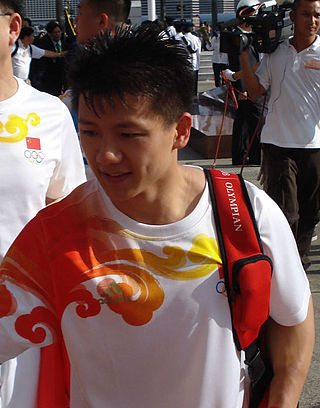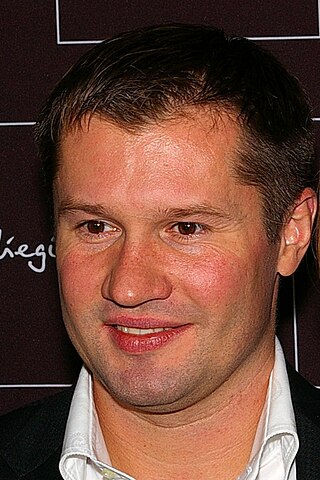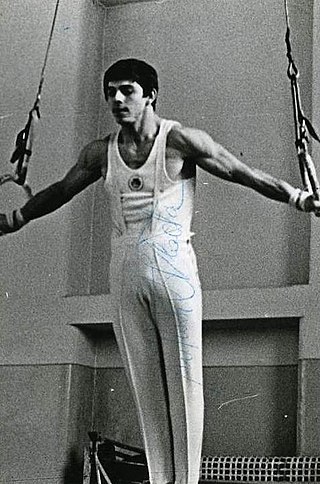
The men's rings was a gymnastics event contested as part of the Gymnastics at the 1964 Summer Olympics programme at the Tokyo Metropolitan Gymnasium. The event was held on 18, 20, and 22 October. There were 128 competitors from 29 nations, with nations in the team competition having up to 6 gymnasts and other nations entering up to 3 gymnasts. The event was won by Takuji Hayata of Japan, the nation's first victory in the rings after two Games with bronze medals. Silver went to Franco Menichelli of Italy, the nation's first rings medal since 1932. Boris Shakhlin of the Soviet Union took bronze, breaking a three-Games gold medal streak for the Soviets. Shakhlin was the fourth man to win multiple medals in the rings, adding to his 1960 silver.

The men's pommel horse competition was one of eight events for male competitors of the artistic gymnastics discipline contested in the gymnastics at the 2004 Summer Olympics in Athens. The qualification and final rounds took place on August 14 and August 22 at the Olympic Indoor Hall. There were 80 competitors from 31 nations, with nations competing in the team event having up to 5 gymnasts and other nations having up to 2 gymnasts. The event was won by Teng Haibin of China, the nation's first victory in the pommel horse since 1984 and second overall. Marius Urzică of Romania took silver to become the first man to win three medals on the pommel horse. Takehiro Kashima put Japan back on the pommel horse podium for the first time since 1988 with his bronze.

The men's rings competition was one of eight events for male competitors of the artistic gymnastics discipline contested in the gymnastics at the 2004 Summer Olympics in Athens. The qualification and final rounds took place on August 14 and August 22 at the O.A.C.A. Olympic Indoor Hall. There were 77 competitors from 28 nations, with nations competing in the team event having up to 5 gymnasts and other nations having up to 2 gymnasts. The event was won by Dimosthenis Tampakos of Greece, the nation's first victory in the rings since 1896 and second overall. Yordan Yovchev of Bulgaria took silver, while Jury Chechi of Italy earned bronze. All three men had previously won a medal in the event; they were the 9th, 10th, and 11th men to win multiple rings medals.

The men's rings competition at the 2008 Summer Olympics was held on August 18 at the Beijing National Indoor Stadium. The eight competitors with the highest scores in qualifying proceeded to the men's rings finals. There, each gymnast performed again; the scores from the final round determined final ranking. There were 70 competitors from 25 nations that competed on the rings, with nations in the team event entering up to 5 gymnasts while other nations could enter up to 2. The event was won by Chen Yibing of China, the nation's first victory in the rings since 1984. Yang Wei, also of China, took silver. Bronze went to Oleksandr Vorobiov, the nation's first medal in the event.

The men's pommel horse competition was one of eight events for male competitors in artistic gymnastics at the 2000 Summer Olympics in Sydney. The qualification and final rounds took place on September 16 and 24 at the Sydney SuperDome. There were 80 competitors from 29 nations; nations competing in the team event could have up to 5 gymnasts in the vault, while other nations could have up to 2 gymnasts. The event was won by Marius Urzică of Romania, the nation's first victory in the men's pommel horse. France earned its first medal in the event, with Eric Poujade's silver. Bronze went to Alexei Nemov of Russia, his second consecutive bronze medal in the event. Urzică and Nemov were the eighth and ninth men to win multiple medals in the pommel horse.

The men's rings competition was one of eight events for male competitors in artistic gymnastics at the 2000 Summer Olympics in Sydney. The qualification and final rounds took place on September 16 and 24 at the Sydney Super Dome. There were 78 competitors from 29 nations; nations competing in the team event could have up to 5 gymnasts in the vault, while other nations could have up to 2 gymnasts. The event was won by Szilveszter Csollány of Hungary, the nation's first victory in the rings. Csollány, who had taken silver in 1996, became the eighth man to win multiple medals in the event. The silver this time went to Dimosthenis Tampakos of Greece—the first medal in the event for a Greek gymnast since 1896. Yordan Yovchev earned Bulgaria's first rings medal since 1960 with his bronze.

The men's vault competition was one of eight events for male competitors in artistic gymnastics at the 1996 Summer Olympics in Atlanta. The qualification and final rounds took place on July 20, 22 and 29th at the Georgia Dome. There were 105 competitors from 31 nations, with nations in the team event having up to 7 gymnasts and other nations having up to 3 gymnasts. The event was won by Alexei Nemov of Russia, the nation's first victory in the men's vault after the dissolution of the Soviet Union. Yeo Hong-Chul gave South Korea its third consecutive podium appearance in the event, this time with silver. Vitaly Scherbo of Belarus was the fifth man to win multiple medals in the vault, adding bronze to his 1992 gold.

The men's pommel horse competition was one of eight events for male competitors in artistic gymnastics at the 1996 Summer Olympics in Atlanta. The qualification and final rounds took place on July 20, 22 and 28th at the Georgia Dome. There were 102 competitors from 31 nations, with nations in the team event having up to 7 gymnasts and other nations having up to 3 gymnasts. The event was won by Li Donghua of Switzerland, the nation's first victory in the men's pommel horse since 1928. It was the first time since 1980 that the pommel horse did not have a tie for first place. Marius Urzică earned Romania's first pommel horse medal with his silver, while Alexei Nemov earned Russia's first as a nation separate from the Soviet Union with his bronze.

The men's parallel bars competition was one of eight events for male competitors in artistic gymnastics at the 1996 Summer Olympics in Atlanta. The qualification and final rounds took place on July 20, 22 and 29th at the Georgia Dome. There were 106 competitors from 31 nations, with nations in the team event having up to 7 gymnasts and other nations having up to 3 gymnasts. The event was won by Rustam Sharipov of Ukraine, the nation's first victory in the men's parallel bars after the dissolution of the Soviet Union. Jair Lynch earned the United States' first medal in the event since 1984 with his silver. Defending champion Vitaly Scherbo earned bronze for Belarus. He was the sixth man to win multiple medals in the parallel bars.

The men's horizontal bar competition was one of eight events for male competitors in artistic gymnastics at the 1996 Summer Olympics in Atlanta. The qualification and final rounds took place on July 20, 22 and 28th at the Georgia Dome. There were 105 competitors from 31 nations, with nations in the team event having up to 7 gymnasts and other nations having up to 3 gymnasts. The event was won by Andreas Wecker of Germany, the nation's first victory in the men's horizontal bar since 1896. Wecker, who had won silver four years earlier, was the ninth man to win multiple medals in the event. Silver in 1996 went to Krasimir Dunev, Bulgaria's first horizontal bar medalist since 1980. There was a three-way tie for bronze: Russia and Belarus earned medals in their first independent appearances with Alexei Nemov and Vitaly Scherbo, respectively, while Fan Bin earned China's first medal in the event since 1984.

The men's individual all-around competition was one of eight events for male competitors in artistic gymnastics at the 1996 Summer Olympics in Atlanta. The qualification and final rounds took place on July 20, 22 and 24th at the Georgia Dome. There were 111 competitors from 31 nations. Each nation could enter a team of 7 gymnasts or up to 3 individual gymnasts. The event was won by Li Xiaoshuang of China, the nation's first victory in the event and first medal of any color since 1984. Two nations making their debut as independent nations after the dissolution of the Soviet Union took silver and bronze. Scherbo had won the event as a member of the Unified Team in 1992; he was the 11th man to earn multiple all-around medals.
The men's vault competition was one of eight events for male competitors in artistic gymnastics at the 1992 Summer Olympics in Barcelona. The qualification and final rounds took place on July 29 and August 2 at the Palau dels Esports de Barcelona. There were 93 competitors from 25 nations, with nations in the team event having 6 gymnasts while other nations could have up to 3 gymnasts. The event was won by Belarusian Vitaly Scherbo of the Unified Team, the first victory by a Soviet or former Soviet in the event since 1980. The silver went to Hrihoriy Misyutin, a Ukrainian also competing for the Unified Team. Yoo Ok-ryul gave South Korea its second consecutive bronze medal in the men's vault.
The men's rings competition was one of eight events for male competitors in artistic gymnastics at the 1992 Summer Olympics in Barcelona. The qualification and final rounds took place on 27 July, 29 July and 2 August at the Palau dels Esports de Barcelona. There were 93 competitors from 25 nations, with nations in the team event having 6 gymnasts while other nations could have up to 3 gymnasts. The event was won by Vitaly Scherbo of the Unified Team, the fourth time in five Games that a Soviet or former Soviet gymnast won the rings. Li Jing of China earned silver. There was a tie for third, with Andreas Wecker of Germany and Li Xiaoshuang of China each receiving bronze medals. It was the first medal for unified Germany since 1936, though East Germany had won gold and bronze in 1988.
The men's parallel bars competition was one of eight events for male competitors in artistic gymnastics at the 1992 Summer Olympics in Barcelona. The qualification and final rounds took place July 27, 29 and August 2 at the Palau dels Esports de Barcelona. There were 93 competitors from 25 nations, with nations in the team event having 6 gymnasts while other nations could have up to 3 gymnasts. The event was won by Vitaly Scherbo of the Unified Team, the third time in four Games that a Soviet or former Soviet gymnast won the rings. Li Jing of China earned silver. There was a three-way tie for third, with Igor Korobchinski of the Unified Team, Guo Linyao of China, and Masayuki Matsunaga of Japan each receiving bronze medals. They were the first medals for China in the parallel bars.

The men's horizontal bar competition was one of eight events for male competitors in artistic gymnastics at the 1992 Summer Olympics in Barcelona. The qualification and final rounds took place on July 27, 29 and August 2 at the Palau dels Esports de Barcelona. There were 93 competitors from 25 nations, with nations in the team event having 6 gymnasts while other nations could have up to 3 gymnasts. The event was won by Trent Dimas of the United States, the nation's first victory in the event since 1932 and fourth gold medal in the horizontal bar overall. Andreas Wecker of Germany earned silver in the nation's return after unification; the first medal for "Germany" in the event since 1952. The Unified Team's Grigory Misutin took bronze.

The men's pommel horse competition was one of eight events for male competitors in artistic gymnastics at the 1988 Summer Olympics in Seoul. The qualification and final rounds took place on September 18, 20 and 24th at the Olympic Gymnastics Hall. There were 89 competitors from 23 nations, with nations competing in the team event having 6 gymnasts and other nations having up to 3 gymnasts. For the second time, the event ended in a three-way tie for first place. Dmitry Bilozerchev of the Soviet Union, Zsolt Borkai of Hungary, and Lubomir Geraskov of Bulgaria each received a gold medal. It was Bulgaria's first medal in the pommel horse. Hungary had its third gold medal in four Games, with Zoltán Magyar winning in 1976 and 1980 before the nation was part of the Soviet-led boycott in 1984. The Soviets had had an eight-Games medal streak in the event snapped by that boycott; Bilozerchev's medal put the nation back on the podium after that one-Games absence.

The men's rings competition was one of eight events for male competitors in artistic gymnastics at the 1988 Summer Olympics in Seoul. The qualification and final rounds took place on September 18, 20, and 24th at the Olympic Gymnastics Hall. There were 89 competitors from 23 nations, with nations competing in the team event having 6 gymnasts and other nations having up to 3 gymnasts. For the second consecutive Games, the event ended in a way tie for first place. Dmitry Bilozerchev of the Soviet Union and Holger Behrendt of East Germany each received a gold medal. It was East Germany's first medal in the rings. The Soviets had had an eight-Games medal streak in the event snapped by their boycott of the 1984 Games; Bilozerchev's medal put the nation back on the podium after that one-Games absence. Sven Tippelt, also of East Germany, took bronze.

The men's rings competition was one of eight events for male competitors in artistic gymnastics at the 1976 Summer Olympics in Montreal. The qualification and final rounds took place on July 18, 20, and 23rd at the Montreal Forum. There were 90 competitors from 20 nations, with nations competing in the team event having 6 gymnasts while other nations could have up to 3 gymnasts. The event was won by Nikolai Andrianov of the Soviet Union, the nation's first victory in the rings since 1960. Another Soviet gymnast, Alexander Dityatin, took silver. The Soviet podium streak in the event reached seven Games. Dan Grecu earned Romania's first medal in the rings. Japan's three-Games gold medal streak and five-Games podium streak in the event ended as the nation's best results were fifth and sixth places.

The men's rings competition was one of eight events for male competitors in artistic gymnastics at the 1980 Summer Olympics in Moscow. The qualification and final rounds took place on July 20, 22 and 25th at the Luzhniki Palace of Sports. There were 65 competitors from 14 nations, with nations competing in the team event having 6 gymnasts while other nations could have to up to 3 gymnasts. The event was won by Alexander Dityatin of the Soviet Union, the nation's fifth victory in the rings, with fellow Soviet Aleksandr Tkachyov taking silver. It was the second consecutive Games that the Soviet Union had the top two men in the rings. Dityatin, the silver medalist in Montreal 1976, was the seventh man to win multiple medals in the rings. Jiří Tabák earned Czechoslovakia's first medal in the event since 1948.

The men's rings competition was one of eight events for male competitors in artistic gymnastics at the 1984 Summer Olympics in Los Angeles. The qualification and final rounds took place on July 29, 31 and August 4 at UCLA’s Pauley Pavilion. There were 71 competitors from 19 nations, with nations competing in the team event having 6 gymnasts while other nations could have to up to 3 gymnasts. The event was won in a tie between Li Ning of China, in the nation's debut in the Games, and Koji Gushiken, with Japan's first gold medal in the rings since 1972. The bronze medal went to American Mitchell Gaylord, the nation's first medal in the event since 1932. The Soviet Union's eight-Games podium streak in the event ended with no Soviets competing due to the boycott.















